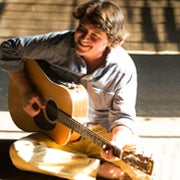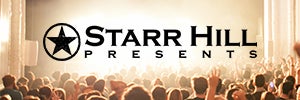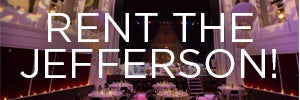An Evening with Keller Williams
Keller Williams released his first album in 1994, FREEK, and has since given each of his albums a single syllable title: BUZZ, SPUN, BREATHE, LOOP, LAUGH, HOME, DANCE, STAGE, GRASS, DREAM, TWELVE, LIVE, ODD, THIEF, KIDS, BASS, PICK, FUNK, VAPE, SYNC and RAW, , those who have followed his career will know this. Each title serves as a concise summation of the concept guiding each project. GRASS, for example, is a bluegrass recording cut with the husband-wife duo The Keels. STAGE is a live album and DREAM is the realization of Keller’s wish to collaborate with some of his musical heroes. THIEF is a set of unexpected cover songs, KIDS offers Keller’s first children’s record, PICK presents Keller’s collaboration with royal bluegrass family The Travelin’ McCoury’s, and RAW is a solo acoustic album. Each album showcases Keller’s comprehensive and diverse musical endeavors and functions to provide another piece of the jigsaw puzzle that is Keller Williams. Keller’s collaborative and solo albums reflect his pursuit to create music that sounds like nothing else. Unbeholden to conventionalism, he seamlessly crosses genre boundaries. The end-product is astounding and novel music that encompasses rock, jazz, funk, and bluegrass, and always keeps the audience on their feet.
Since he first appeared on the scene in the early ’90s, Williams has defined the term independent artist. And his recordings tell only half the story. Keller built his reputation initially on his engaging live performances, no two of which are ever alike. For most of his career he has performed solo. His stage shows are rooted around Keller singing his compositions and choice cover songs, while accompanying himself on acoustic guitar. With the use of today’s technology, Keller creates samples on the fly in front of the audience, a technique called live phrase sampling or looping, with nothing pre-recorded, the end result often leans toward a hybrid of alternative folk and groovy electronica. A genre Keller jokingly calls “acoustic dance music” or ADM.”
That approach, Williams explains, was derived from “hours of playing solo with just a guitar and a microphone, and then wanting to go down different avenues musically. I couldn’t afford humans and didn’t want to step into the cheesy world of automated sequencers where you hit a button and the whole band starts to play, then you’ve got to solo along or sing on top of it. I wanted something more organic yet with a dance groove that I could create myself.”
Williams’ solo live shows—and his ability to improvise to his determinedly quirky tunes despite the absence of an actual band—quickly became the stuff of legend, and his audience grew exponentially when word spread about this exciting, unpredictable performer. Once he began releasing recordings, starting with 1994’s FREEK, Williams was embraced by an even wider community of music fans, particularly the jam band crowd. While his live gigs have largely been solo affairs, Williams has nearly always used his albums as a forum for collaborations with fellow musicians. An alliance with The String Cheese Incident on 1999’s BREATHE marked Williams’ first release on the band’s label SCI Fidelity Records, DREAM, Keller’s 2007 release, found him in the company of such iconic musicians as the Grateful Dead’s Bob Weir, banjo master Béla Fleck, bass great Victor Wooten, American musician/poet Michael Franti and many others.
“That album took, from start to release time,” says Williams, “about three years. The object was to get people that I admire musically to play my stuff, so when I’m old I can crank this album in my pimped-out golf cart and have something that I’m really proud of. I was going for the historical effect for my own personal listening pleasure.
“Each record,” he continues, “is a little snapshot of history. I like to think of it as a period piece for an artist. Each record is a little bit different but all of them have some kind of common thread, which is my musical ability as far as I can take it. I enjoy making records. In some people’s eyes, they’re a dying breed, but I’m very passionate about it. They document where my head is at that time in my career and where I am in my songwriting.”
Williams’ story begins in Fredericksburg, Virginia, just south of Washington, D.C. There he was exposed to a wide variety of music at an early age, starting with country and bluegrass and working his way up through hip-hop and go-go, a brand of funk particular to that part of the country. Once he began playing guitar, Williams’ sphere expanded to what he calls “the post-pseudo-skateboarder punk-rock rebellious type of thing, Black Flag and Sex Pistols and Ramones, Dead Kennedys, things like that. That slid into the more melodic college rock, like the Cure and the Cult, the Smiths, R.E.M.’s first five or six records.
Then came the Grateful Dead, a seminal influence on Williams’ own music. “I studied and learned their music and went to the shows,” he says, adding that the impact of Jerry Garcia on his attitude toward music remains incalculable. Another major influence was Michael Hedges, the late virtuoso acoustic guitarist. “He was really excelling in a whole different world from what I knew,” says Williams.
After relocating to Colorado, further exposure to bluegrass music and progressive acoustic artists such as Béla Fleck and the Flecktones also had a major impression on Williams. As he began to develop his own distinctive compositional and performing style, Williams incorporated all of the lessons he’d learned from the long list of artists who’d found their way into his world, then filtered their music through his own experiences until something wholly unique emerged. The list of artists whose music he has covered either in concert or on his recordings constitutes a mind-blowing spread: songs originally performed by everyone from Pink Floyd and Ozzy Osbourne to Ani DiFranco and old-school rappers the Sugar Hill Gang!
When he first started out, Williams played in regional bands but also performed as a solo artist, “me sitting on a stool playing covers, like a happy hour situation,” he says. “I’d get dinner and maybe tips. There were bands in high school and in college. But it turned out I could get the same money playing solo that I was getting with the band. Around that time I was also doing temporary jobs and I was making the same amount playing music as I was scraping mortar out of the cracks of cinder block walls for eight hours in the summertime at minimum wage. So it seemed like the obvious choice was to play music. I started to work and over the years I incorporated more technology. The looping thing started to happen and tickets were sold and people came to shows, so there wasn’t any reason to fix something that wasn’t broken.”
What Williams calls “the looping thing” is actually a big part of what has made him such a compelling live performer. “Basically, I have these machines that are essentially delay units,” he explains. “What I do is step on a button and sing or play something. Then I step on the same button in time and it repeats what I just played or sang. Once that initial loop is created, I can layer on a bass line or a drum line and then have this layer that I just created in front of an audience that I could sing over and solo over. Nothing is pre-recorded. Everything is created onstage in front of the audience.”
If it sounds complicated, it is: but the basic thrust is that the technology has allowed Williams to go out on tour week after week, year after year, and play music by himself—without limiting his sound to what we most often associate with the solo singer-songwriter: a guy strumming a guitar and singing. With his arsenal of tech toys, Williams can expand his reach onstage by, in essence, jamming with himself.
As years have gone by and Keller has continued to evolve he has created more and more unique projects and collaborations with fellow musicians. In 2007 Keller formed a band of his own, Keller Williams with Moseley, Droll and Sipe which featured Keller on rhythm guitar and vocals, Jeff Sipe on drums, Keith Moseley on bass and Gibb Droll on lead guitar. After touring throughout 2007 - 2008, they subsequently released a double live record with a companion DVD, in true Keller Williams fashion, it’s called Live.
The summer of 2010 found Keller sharing a bus with two of his biggest heroes, former Grateful Dead drummers Bill Kreutzmann and Mickey Hart, as a member of their powerhouse assemblage the Rhythm Devils. “That was a very surreal experience,” Williams says. “We rehearsed for a few days and then we were on a bus with 12 people, two of them being the original drummers from the Grateful Dead.” On that tour, Williams was put in the enviable position of singing many songs from the Grateful Dead catalog for audiences that loved every minute of it. Inspired by this experience and his admiration for The Grateful Dead, Keller added two Grateful Dead projects to his repertoire: Grateful Grass and Grateful Gospel. With an ever revolving cast of Jam, Bluegrass, and Gospel musicians, Grateful Grass and Grateful Gospel have become fan favorites and festival staples. Keller’s Grateful Grass tunes can be heard on two live digital releases, REX and DOS. Keller’s guests on these recordings include: Jeff Austin (Jeff Austin Band), Keith Moseley (String Cheese Incident), Michael Kang (String Cheese Incident), Reed Mathis (Tea Leaf Green), The Keels and many more.Following the Grateful Dead theme, keller also released KEYS, a digital only release on which Keller is at the piano singing a collection of Dead tunes. All three of these releases donate proceeds to the Grateful Dead’s Rex Foundation.
Williams has also toured as part of a string trio with fellow Virginians, singer/guitarist Larry Keel and his wife, singer/bassist Jenny Keel, dubbed Keller and the Keels. You can find them hitting key stops on the bluegrass festival circuit playing songs from their two releases GRASS AND THIEF.
If it seems as if this is a man who never stops, that would be about right. Keller released the amusingly titled THIEF—his all-covers project with the Keels—early in 2010, and KIDS, his sixteenth album, in the fall of that same year. A father of two himself, Williams was, of course, inspired by his own offspring but, he says, some of the songs were written before his children were born. “When Not For Kids Only by Jerry Garcia and David Grisman came out, I knew that there was hope for me with kids music,” he says. “I was really attached to that record.” The songwriting for Kids, Keller says, “was not necessarily singing to the kids. A lot of it was me singing from the perspective of the kids. That was my plan, to get on their wavelength, on their level, and be one of them, so it’s kind of like one of their friends singing to them.”
In 2011, BASS found the multi-instrumentalist only playing bass guitar. BASS was also the first album to be recorded with Keller’s live reggae-funk band Kdubalicious, which in addition to Keller on bass and vocals, features Jay Starling on keyboards and Mark D on drums. On the other end of the spectrum – but just as tasty – is Keller’s 2012 release PICK. This collaboration featuring Keller Williams with The Travelin’ McCourys is a classic case of the whole being greater than the sum of its parts—although the parts are rather massive on their own, to be sure. “Performing with The Travelin’ McCourys is one of my favorite things to do in the world,” Keller explains. “This project has struck a special chord with me [pun intended]. It is very addictive.”
Indeed, Keller always enjoys working with a band. For 2013 he stepped out with a new muse, a 6-piece funk band dubbed More Than a Little. Williams drew from the Richmond, VA R&B/gospel scene including a pair of show stealing female singers. FUNK – a sexy live recording that pays deep homage to the genre’s roots, Keller style – hit the streets in November 2013 and More than a Little made its way around the country becoming a festival staple all their own.
Early 2015 found Keller back in the studio working on his 20th release, VAPE. While mainly a solo endeavor, it does feature a few special guests such as Sampson Grisman, John Kadlecik and a track with the Travelin’ McCourys. In Keller’s own words “Imagine taking these songs and blowing high pressured life through them in a low pressured atmosphere. Out comes highly concentrated music that can be heated up and inhaled through your ears...Vape”.
In 2016, Keller assembled yet another band, Keller Williams’ KWahtro. KWahtro, featuring Gibb Droll, Danton Boller and Rodney Holmes, toured the country throughout the winter and fall of 2016. The first KWahtro album, SYNC will be released in January of 2017. According to Keller, SYNC began as acoustic dance music but with the help of Droll, Boller and Holmes and special guests Mike Dillon and The Accidentals, the album “morphed into a type of acoustic acid jazz that draws on imagery in both the lyrics and the music.”
As if one album release wasn’t enough for 2017, Keller’s first all solo acoustic album, RAW, will also be released in January of 2017. Keller started working on RAW in 2011 but got sidetracked by a number of other projects that began to take form. It was when Keller’s 2017 winter tour, Shut the Folk Up and Listen with Leo Kottke, started to take form, that he jumped back into it and completed the album. For Keller this album and tour represent his roots; all solo acoustic guitar and vocals, no looping, pedals or bands.
Two albums at once, why not! Something different. That, we can assume, is how it will always be with Keller Williams.
Read More
Design VisualSHOWINGS
This event has already occurred.
Jefferson
-
Thu, Apr 3, 2025
Paul Cauthen - *Cancelled*
-
Sat, Apr 5, 2025
John Vincent III
-
Thu, Apr 10, 2025
STRFKR *RESCHEDULED*
-
Sat, Apr 12, 2025
Nicotine Dolls *Rescheduled*


